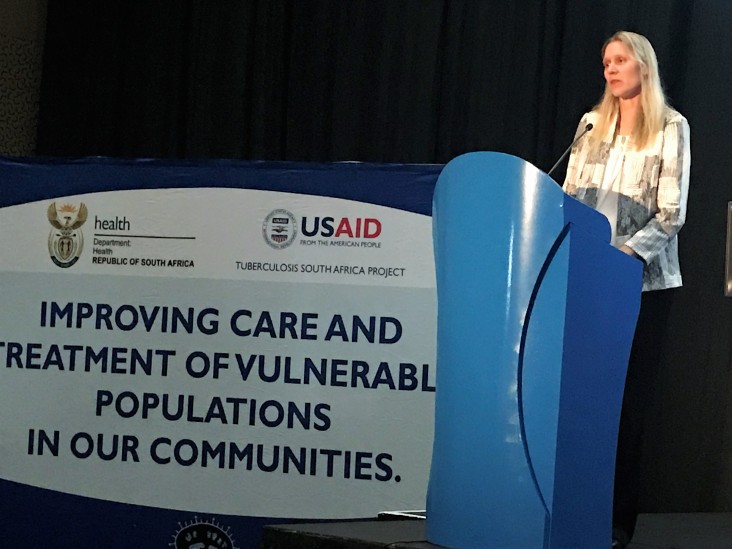Speeches Shim

- Honorable chair; Mr. David Mametja
- Honored guests
- Partners, friends and colleagues
Good morning and thank you on behalf of the USAID and the United States government for the opportunity to join you for this session.
I feel so grateful to return to Durban for the second time to be part of another big event on TB. I had the opportunity of attending this year’s World TB Day event held here in Durban, earlier. I was happy to see the commitment from the various leaders taking charge, to ensure that those they lead, adopt healthier lifestyles, and also get access to information and health care services.
I feel very honored to be part of this important session, where we’ll discuss the most important aspect of combatting TB, that is finding missing TB patients among key populations.
As it is well known among us, that South Africa is one of the countries with the highest burden of TB, according to World Health Organization, and with that in mind, it becomes very important that greater interventions should be applied to halt the spread of this disease, with more focus on key populations.
Despite the declining mortality rates, TB still remains the number one killer in South Africa.
We all here know that TB is curable, but the important thing is to understand how much does the public know about TB, in terms of what it is, how it spreads and where to check yourself and also access medication. Last year South Africa launched the National Strategic Plan (NSP) for HIV, TB and other STIs (2017 -2022) in order to reach the 90-90-90 targets towards a TB and AIDS free society as set by UNAIDS. USAID supports the NSP and is very proud to be working hand-in-hand with the National Department of Health in order to reach those targets.
South Africa has made some remarkable progress in responding to the HIV/AIDS epidemic, and has the largest antiretroviral treatment program in the world, an accomplishment which speaks for itself and one of which you should be proud, and I believe the same should happen with TB.
We all know that, without addressing TB, and the growing threat of MDR-TB and XDR-TB, we will be hard-pressed to control the AIDS epidemic. I’m pleased to say that South Africa has made tremendous progress in responding to the TB epidemic. And, in doing so, it has demonstrated global leadership.
I’m also encouraged by Minister Motsoaledi and his department in ensuring that TB is also placed on the top agenda of diseases that need to be dealt with by putting more effort in terms of resources and information. As we celebrate Nelson Mandela’s centenary, we must also remember that he was also a TB survivor, and he once said: “We can’t fight AIDS unless we do much more to fight TB as well”
I’m proud that the United States government has been a strong partner with South Africa in the fight against TB and we will continue to partner because, despite the great successes we have reached, there is still much to do.
Our flagship project, the USAID TB South Africa Project, in partnership with the National Department of Health and other key stakeholders, is making good progress to address the issue of finding the missing TB cases and allocating resources on working with key populations.
Our project has begun community dialogues to engage members of the general public in five provinces to talk about TB. These interventions are yielding good results in terms of informing those at risk of contracting TB, and also ensuring that TB patients are not lost to the system. Hopefully, these dialogues will be expanded to reach more communities to beat TB.
I will leave this to our lovely, Ms. Lerato Lebona who will speak more about the finding missing TB patients’ interventions done by the USAID Tuberculosis South Africa Project.
We are very proud of public and private partners that have embraced this fight against TB, and have brought in their resources in partnership with the South African National Health Department to ensure that South Africa beats TB. We are hoping that more and more will join this fight.
The committed professional health workers found in the various community health centers are also important as they are the first points of contact for TB patients, and they deserve the support and encouragement by all to continue the good work.
Amongst the SA TB Ambassadors who were at the World TB Day event, there was a medical doctor who spoke about how she contracted TB, whilst working with patients. This issue of doctors was also highlighted recently in the media that numbers of medical professional contracting TB is also increasing. So I’m hoping that when we talk about “Key Populations”, health workers are included in that category.
As you continue to do this outstanding battle of curbing TB, never forget to continue to mobilizing leaders at national, provincial and community level such as religious, traditional, business and labor leaders. They are important to promoting the uptake of health services amongst South Africans.
USAID will continue to work with the national government to expand the access to TB services among vulnerable and hard-to-reach populations, including people living with HIV, mineworkers, pregnant women, and children. This remains the critical and important component of our TB programs.
Thank you to South Africa’s political leadership, our PEPFAR partners, and every other organization that works to end TB. Let’s BEAT TB
Thank you.

Comment
Make a general inquiry or suggest an improvement.